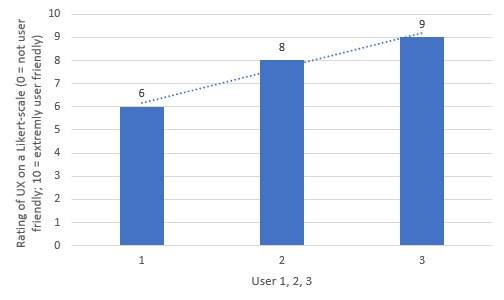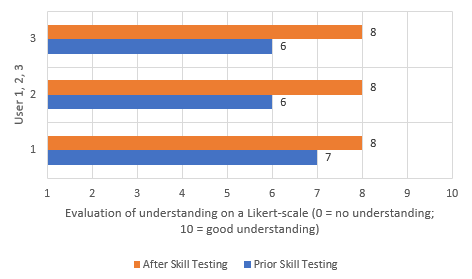“Alexa, starte Herzstolpern” – Development of a speech-based skill and evaluation of the user experience & usability to increase the understanding of atrial fibrillation
Aim and Research Question(s)
The purpose of this thesis is the development and evaluation of a 5-day-speech-based-learning-skill about atrial fibrillation for an Amazon Alexa Echo Show 5. The author investigates the user experience (UX) of this skill, and whether the understanding on atrial fibrillation (AF) increases after using the skill for 5 days.
Background
AF is an underestimated cardiac arrhythmia [1]. 230.000 people in Austria suffer from this disease [2]. The problem is, that untreated AF can increase the risk of a stroke five times [3]. Some people do not always have symptoms, so educating them about the disease, risk factors and symptoms is very important [4].
Methods
An explorative study design was chosen and in total 3 users tested the Alexa skill called Herzstolpern for 5 days and gave feedback about the usability and the UX. The qualitative feedback was implemented, so the skill improved further.
Results and Discussion
The evaluation of the results of the questionnaires show that the UX of the speech-based skill about AF increased through iterative tests (see figure 1).
 Figure 1: User experience results from 3 test users along the testing period of the Alexa skill "Herzstolpern"
Secondly, the understanding of AF compared to the week prior to the testing of Herzstolpern increased after using the skill for five days for all three users (see figure 2).
Figure 1: User experience results from 3 test users along the testing period of the Alexa skill "Herzstolpern"
Secondly, the understanding of AF compared to the week prior to the testing of Herzstolpern increased after using the skill for five days for all three users (see figure 2).
 Figure 2: Understanding of atrial fibrillation prior and after testing the skill "Herzstolpern"
Figure 2: Understanding of atrial fibrillation prior and after testing the skill "Herzstolpern"
Conclusion
The results show that the perception of the voice assistant was positive and that the Herzstolpern skill helped people to gain new information and to increase their understanding on AF.
References
[1] Deutsche Gesellschaft für Kardiologie. (2016): ESC Pocket Guideline. Management von Vorhofflimmern. 2. Überarbeitete Auflage. [2] Institut für Pharmaökonomische Forschung (IPF) GmbH. (2019) [3] Brown et al. (2012). Development of a Conceptual Model of Adherence to Oral Anticoagulants to Reduce Risk of Stroke in Patients with Atrial Fibrillation. Journal of Managed Care Pharmacy, 18(5), 351–362. https://doi.org/10.18553/jmcp.2012.18.5.351 [4] Koponen et al. (2008). Patient knowledge of atrial fibrillation: 3‐month follow‐up after an emergency room visit. Journal of Advanced Nursing, 61(1), 51–61. https://doi.org/10.1111/j.1365-2648.2007.04465.x
